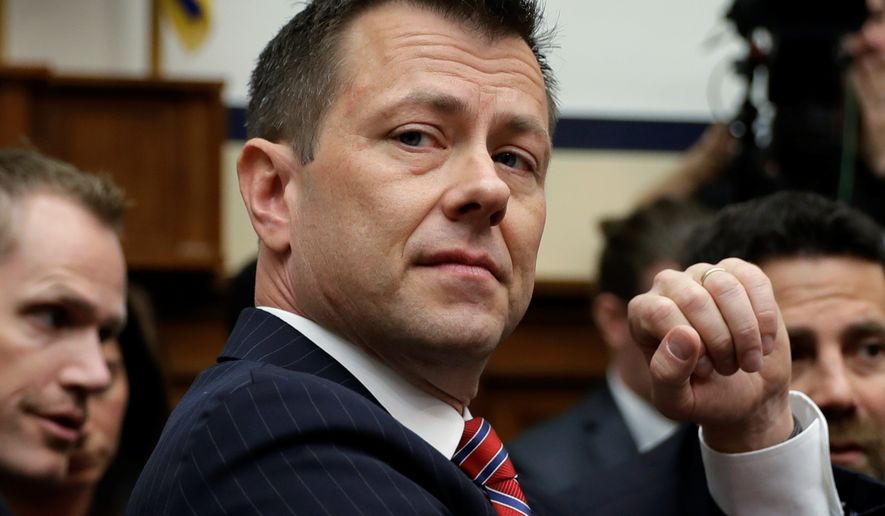The FBI had closed its investigation into former National Security Adviser Michael Flynn in early January 2017, but now-disgraced anti-Trump FBI official Peter Strzok reopened it the same day, new court documents unsealed Thursday revealed.
The documents were made public one day after a handwritten note in Flynn’s criminal case was also unsealed. That note — thought to have been written by former FBI head of counterintelligence Bill Priestap — discussed whether the goal of interviewing Flynn was “to get him to lie, so we can prosecute him or get him fired.”
President Trump on Thursday said the new revelations show Flynn will be exonerated, but he stopped short of saying he would pardon his former national security adviser.
“It looks to me like Michael Flynn would be exonerated. I don’t know if anybody would have to use that [pardon] power,” he told reporters.
Mr. Trump said he would consider bringing Flynn back into the administration, adding that Flynn was a victim of “dirty cops.”
“These were dirty, filthy cops at the top of the FBI, and you know the names better than I do. And they were dishonest people,” Mr. Trump said. “Gen. Flynn is a fine man. You don’t get to where he is by being bad. The dirty cops came in.”
The two document disclosures are a huge boost to Flynn’s quest to withdraw his late 2017 guilty plea for making false statements to Mr. Strzok and another FBI agent during a White House interview.
Federal prosecutors have said Flynn lied about his contacts with the then-Russian ambassador during the presidential transition period in late 2016. Flynn appeared to agree, initially admitting to the crime, before pushing to change his plea last year.
Sidney Powell, the conservative lawyer representing Flynn, has cited “egregious” FBI misconduct as the reason for withdrawing the guilty plea.
The documents released Thursday show that on Jan. 4, 2017, the FBI decided to close the investigation, dubbed Crossfire Razor. That decision came nearly three weeks before Flynn’s ill-fated interview with Mr. Strzok.
In a memo on its decision, the FBI cites “the absence of any derogatory information or lead information” as the reason for ending the probe.
Flynn was under investigation to determine if he “was directed and controlled by” or “coordinated activities with the Russian Federation in a manner which is a threat to national security” of the U.S. or violation of foreign lobbying laws.
Agents failed to turn up any evidence that Flynn had committed a crime, the internal FBI memo revealed.
Despite failing to uncover any wrongdoing by Flynn, Mr. Strzok on the same day stopped the investigation from being terminated, according to the materials.
“Hey if you haven’t closed RAZOR, don’t do so yet,” Mr. Strzok wrote in a text message to the investigating agent. “Pls keep it open for now.”
It is not clear why Mr. Strzok wanted to keep the case active.
The FBI memo details multiple efforts to uncover criminal activity by Flynn that turned up empty.
FBI officials reached out to another agency, likely the CIA, to conduct a similar search of its records for possible ties between Flynn and Russia. Just like the FBI, that agency found “no derogatory information” on Flynn.
The FBI also used at least one confidential human source to monitor Flynn during the investigation. But leads offered by the informant also failed to turn up criminal activity, the memo said.
Based on the lack of evidence, the FBI closed the investigation but noted it would consider reopening it if new information was uncovered.
Yet, Mr. Strzok, the case supervisor, pushed to keep it open, according to the memo. In another text to an unknown person, he noted that the FBI’s leadership was involved and they still “need to decide what to do with him [with respect to] the [Redacted].”
Text messages between Mr. Strzok and FBI lawyer Lisa Page, with whom he was having an extramarital affair, revealed that he had personally edited the official account of Flynn’s interview. Both have since left the bureau.
“Lisa, you didn’t see it before my edits that went into what I sent to you,” he texted her in February 2017.
“I was trying to completely re-write the thing so as to save [redacted] voice and 2) get it out to you for general review and comment in anticipation of needing it soon,” he wrote.
He then followed up by saying he was “trying not to completely re-write” the notes, adding, “I did the edits better than I’m IMing.”
The documents disclosed this week were unearthed during a review of the Flynn case ordered by Attorney General William P. Barr, although a February 2018 court order required the government to hand over any exculpatory materials.
In February, Mr. Barr appointed Jeffrey Jensen, the U.S. attorney in St. Louis, to examine the case. The documents unsealed Wednesday are evidence that probe has produced results for Flynn’s legal team.
Republican lawmakers rushed to condemn the FBI Thursday, accusing the bureau of trying to frame Flynn.
Vice President Mike Pence said he was “deeply troubled by revelations of what appears to have been investigative abuse by officials in the Justice Department.”
When asked if Flynn should have been fired, Mr. Pence responded, “I know what Gen. Flynn told me and I’m more inclined to believe it was unintentional than ever before.”
Sen. Rand Paul of Kentucky and Rep. Matt Gaetz of Florida, both Republicans, called for a full pardon for Flynn.
While Democrats largely sidestepped the issue, some left-leaning commentators said the FBI’s actions were not unusual for a criminal case.
Elie Honig, a former federal prosecutor, said every time he interviewed a subject there were three potential outcomes.
“Subject: 1) Tells the truth; 2) Lies (& potentially gets charged); 3) Refuses to talk. There is nothing unusual about discussing how each could play out,” Mr. Honig tweeted Thursday.
• Jeff Mordock can be reached at jmordock@washingtontimes.com.




Please read our comment policy before commenting.